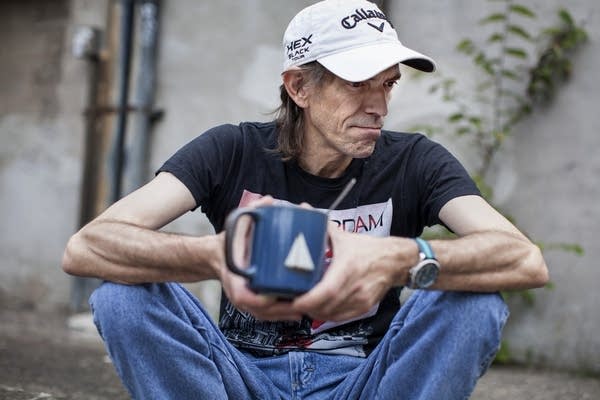This Minneapolis man is on a mission to hand out needles, Narcan

Go Deeper.
Create an account or log in to save stories.
Like this?
Thanks for liking this story! We have added it to a list of your favorite stories.
Lee Hertel is a familiar face to drug users and suppliers in the Twin Cities. Wiry, with a nervous energy, he sits on a curb in the parking lot of a south Minneapolis coffee shop, pulling items from a black backpack. There are clean syringes, cottons, tourniquets, metal cookers — and naloxone, the medicine that can reverse an opioid overdose, often sold under the brand name Narcan.
Under the name Lee's Rig Hub, he has been getting safe and clean equipment to drug users by simply being around the places drugs are being sold or used.
"I'll ride along with people and go along with them on their deliveries. I'll also hang out in some of the houses where people are buying, taking, using, stealing drugs," Lee, 50, said. "People ask me questions — so I can educate. I can hand out the Narcan to them."
At least 100 heroin users in Minnesota died from an overdose in 2014, according to the Centers for Disease Control and Prevention. More than twice that number died after overdosing on other sorts of opioids, such as methadone or prescription painkillers. Deaths from opioids have increased steadily over the last decade across the state and country.
Turn Up Your Support
MPR News helps you turn down the noise and build shared understanding. Turn up your support for this public resource and keep trusted journalism accessible to all.
Yet many public health services struggle to connect with street-drug users, who fear being imprisoned or having their drug use become known. That makes it hard to get them safe and potentially life-saving supplies like needles and naloxone.
"You're not going to stop anybody from doing what they want to do, or what they need to do, especially with heroin," Lee said. "I can't stop anybody from doing what they want to do, but I can keep them alive until they want to stop, until something happens, that come-to-Jesus moment. Whatever it might be."
More stories: Opioid overdose — and the families and friends left behind
Naloxone is more widely available now in Minnesota than it was a few years ago. It's for sale at some pharmacies. And it's available at treatment centers and through a few nonprofits.
Lee said the safe supplies and naloxone he provides make it into the hands of people from every corner of society.
"Nobody has any idea how pervasive drugs are in the Twin Cities. Every sex. Every socioeconomic status. They're everywhere. Even I don't have any idea," he said. "It could be anybody's neighbor. Anybody's son, daughter, loved one."
Lee said he tried smoking heroin once, but it isn't his "drug of choice." He said users trust him partly because his goal is to keep them alive — he doesn't preach sobriety.
"They hear that all the time, everywhere they go. That's why they don't even want to go to the hospital for an abscess, because they don't want to be told that they shouldn't be doing drugs," he said. "Well, yes. They know they shouldn't be doing drugs, but the fact of the matter is that they are. You telling them that is not going to help, it's just going to make them feel more stigma."
The state doesn't keep tabs on how many opioid overdoses are reversed by using naloxone. The closest number available is one Twin Cities treatment center's tally of confirmed opioid overdose reversals that are reported to them. Last year, they counted 197. Lee and others who work to prevent overdose deaths say the true number is probably much higher.
During the more than five years that he's been handing out safe supplies in the state, Lee estimates he has distributed about 11 liters, or about 11,000 cc's, of naloxone. As little as 1 cc of the medicine injected into an arm muscle can reverse an overdose and maybe save a life.
"Two weeks ago, I met up with a young man, gave him a bunch of Narcan. He always asks me, 'Do you have any idea how many lives you've saved? I say, 'No,'" Lee said. "He says, 'Dude, you saved mine eight times in one month.'"
Even before Steve's Law passed in 2014 and made naloxone more widely available in Minnesota, Lee was doing this work. He said a donor he declined to identify covers the cost of as much naloxone as he can hand out.
When Lee still has minutes on his phone, it's not unusual for him to get a call from someone telling him the naloxone he provided saved their life.
"I process it like a punch to the gut and then another one right to the heart. It leaves me speechless, I can't even breathe," Lee said. "That's how it leaves me." He doesn't make money from the project. He's cagey about his personal life. But he says this is the best job he's ever had. He sees himself as an activist, standing up for people who use drugs.
"So many people just treat it like, 'Pfff, it's just another drug user. Let them die. Who cares?,'" Lee said. "I just don't get that, because everybody has a story. And there are so many reasons why people use."



